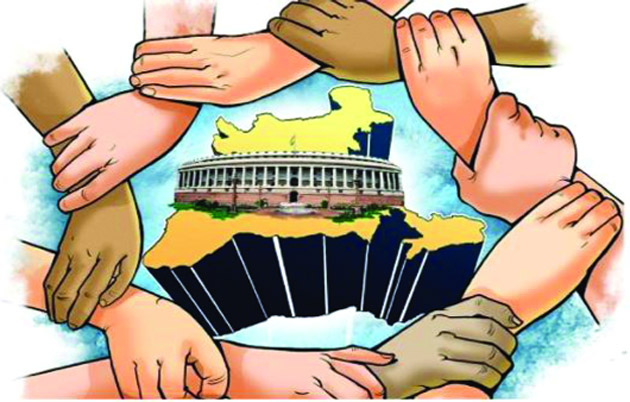Vijay Hashia
The Supreme Court of India reaffirmed its trust in Electronic Voting Machines (EVMs) while refraining from issuing a verdict on a petition advocating for 100% EVM-Voter Verified Paper Audit Trail (VVPAT) verification. The use of EVMs had stood the test of time with increasing voting percentage reflecting voters’ faith in it, SC ruled out the possibility of returning to ballot paper. The Supreme Court further said, there is no incident of hacking yet. We are not the controlling authority of another constitutional authority. We cannot control the elections. So, SC cannot issue mandamus on basis of suspicion of manipulation of EVMs. This decision marks a significant landmark ruling in addition to a series of judicial interventions since independence, which have played a pivotal role in shaping and enriching India’s democratic fabric.
Among these landmark rulings, the Ponnuswami case of 1952 emerged as a significant legal milestone. Just months prior to India’s inaugural general elections, the Supreme Court interpreted Article 329 (b) of the constitution, asserting that the term ‘election’ encompasses the entire electoral process from the issuance of election notifications to result declarations. The court emphasized that once the electoral process initiates, judicial interference at any intermediate stage is impermissible. Any grievances regarding electoral irregularities must be addressed through an election petition following the declaration of results.
In 1971, amid the Congress split of 1969, factions led by Jagjivan Ram and S. Nijalingappa vied for the party name. The Election Commission sided with the Jagjivan Ram faction, determining it garnered majority support from Congress MPs, MLAs, and delegates. Applying the same rationale, the EC adjudicated recent splits in Shiv Sena and NCP akin to its decision in the 1969 Congress case.
The tumultuous events of the mid-1975, resulting the infamous Emergency period, tested the resilience of India’s democratic institutions. The Allahabad High Court’s decision to annul Prime Minister Indira Gandhi’s election from Rae Bareli sent shockwaves across the political spectrum, ultimately leading to the imposition of Emergency rule. However, during pendency of PM’s appeal in SC, Parliament passed Election Laws (Amendment) Act 1975, changing several Representation of People (RP) Act provisions. Parliament also enacted the 39th Constitutional Amendment Act, barring courts from scrutinizing elections of PM and Speaker. The SC in Nov 1975 upheld Indira’s election, but partly struck down the 39th amendment Act.
Entering the new millennium, the Supreme Court issued a series of groundbreaking rulings in 2002, aimed at safeguarding and enhancing voter rights. Notably, in the case of Union of India vs. Association of Democratic Reforms, the Court declared that voters possess a fundamental right to access information about candidates, including details regarding their criminal history, education, and wealth. SC said that the right to information complements the right to choose, stemming from the fundamental right to freedom of speech and expression.
However, the NDA Government attempted to introduce a bill and insert section 33B in the Representation of the People Act (RPA), aiming to exempt candidates from disclosing criminal records. Nevertheless, in 2004, the Supreme Court struck down this provision as unconstitutional, affirming the obligation for candidates to disclose pending criminal cases, including FIRs, ensuring transparency and accountability in electoral processes.
In the Lily Thomas case (2013), the Supreme Court invalidated section 8(4) of the Representation of the People Act. This section permitted MPs and MLAs convicted in corruption cases or sentenced to two or more years in criminal cases to retain legislative positions if they appealed within 90 days. Post-SC ruling, disqualification occurs automatically. Reinstatement is possible if a higher forum suspends conviction and sentence.
In the People’s Union of Civil Liberties (PUCL) case, the Supreme Court introduced (NOTA) option for voters, deeming it crucial for expressing disapproval toward candidates presented by political parties. The Court stressed the significance of allowing voters to voice dissatisfaction, foreseeing it as a catalyst for systemic change. However, NOTA has shown limited impact in elections, despite its intended purpose to encourage parties to nominate candidates of integrity based on public will.
NOTA, a symbolic electoral choice, a “fictional electoral candidate,” necessitate a re-election if victorious. State Election Commissions of Maharashtra, Haryana and Delhi have since 2018 acknowledged NOTA’s significance, completing the electoral reform advocated in the Supreme Court’s ruling.
The Supreme Court’s advice to Prime Ministers and Chief Ministers against appointing individuals with criminal antecedents as ministers underscores its commitment to upholding constitutional values and public trust in governance institutions. The Supreme Court’s role as the custodian of democracy has been instrumental in navigating the complexities of electoral governance and upholding the foundational values of the Constitution.
As India continues its democratic journey, the legacy of judicial interventions will serve as a guiding light, ensuring that the Indian democracy remains vibrant, inclusive, and resilient for generations to come.


